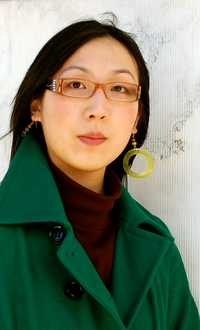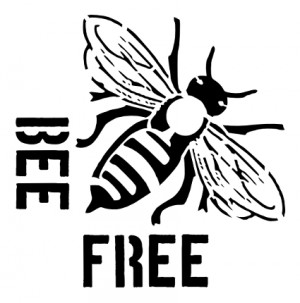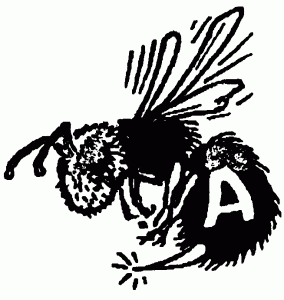“The Cartographer Wasps and the Anarchist Bees” is a delightful fable,1 not only on account of the political themes it explores but also some very fine writing. The short story was first published in Clarkesworld Magazine (Issue 55, April 2011) and then republished by Escape Pod (Episode 343, March 2012). If you’re partial to audio fiction, you can spend a pleasant half hour listening to the story being narrated by Kate Baker (Clarkesworld) or Mur Lafferty (Escape Pod).2 Yu’s tale has been nominated for a 2011 Nebula Award and a 2012 Hugo and is a finalist for a Locus Award and the Million Writers Award, and it is deserving of all of these honors. Yu, a student at Princeton, is a new author to watch.
Yu’s tale warns of the transitive and cyclical nature of violence — from thoughtless destruction to calculated imperialism. It begins with a boy attacking a wasp nest and ending the uneasy truce between the wasps and his village. The villagers make an amazing discovery: the wasps had inked beautiful maps of the land (China) into the walls of their nest. Soon the wasps were hunted to near extinction and a group of survivors manages to escape.
The leader of the surviving wasps has learned well the hard lessons of realpolitick. Once the new nest has been established, she orders her wasps to expand aggressively. A nearby bee hive is enslaved and forced to pay tribute. The victim of violence has resolved to avoid being the victim ever again by becoming the oppressor.
But the subjugation of the bees has unintended consequences. Some of the bees are educated and trained in philosophy, science, and cartography. One day a bee with an inclination to anarchism is born and so educated and trained, and she produces a brood of anarchist sons…
And, well, just go on and read or listen (or both) to the story. It’s free. You won’t be disappointed. Then return to read the spoilery sections below wherein I get a bit analytical.
MILD SPOILER WARNING
Naturally my favorite lines in the story are the ones about anarchism:

To her sons in their capped silk cradles — and they were all sons — she whispered the precepts she had developed while calculating flight paths and azimuths, that there should be no queen and no state, and that, as in the wasp nest, the males should labor and profit equally with the females.
[…]
“Govern us,” they said to the two wasp-taught anarchists, but they refused.
“A perfect society needs no rulers,” they said. “Knowledge and authority ought to be held in common. In order to imagine a new existence, we must free ourselves from the structures of both our failed government and the unjustifiable hegemony of the wasp nests. Hear what you can hear and learn what you can learn while we remain among them. But be ready.”
The “authority … in common” bit might be given a left-anarchist spin, but I think is too ambiguous to really say. It could just mean we should all be equals in political authority à la the Lockean state of nature, not that we must make all decisions collectively. The “knowledge … in common” bit is suggestive of an anti–intellectual property stance — expressing the belief that ideas cannot be owned, with “in common” being analogous to the public domain.
MAJOR SPOILER WARNING
The ending of the story is somewhat ambiguous and has left people speculating. The old bee colony awakens from winter and happens upon the remains of the anarchist bee colony.
Bees lay dead and brittle around it, no identifiable queen among them. Not a trace of honey remained in the storehouse; the dark wax of its walls had been gnawed to rags. Even the brood cells had been scraped clean.
Some have thought that this means the anarchists all died for want of planning, because, you know, it’s just obvious that there can be no economic plans without a central monopolistic authority to hand them down from on high. Is Yu’s point that an anarchist society is not viable? I do not think so. In fact, she tells us that anarchism is a viable hereditary trait in bees and depicts them implementing plans for the fast-arriving winter. Perhaps they simply did not have enough time from the beginning of their exodus to the onset of winter to prepare enough food and shelter to survive. Perhaps they all starved to death through no fault of their political ideals. Or perhaps they were attacked by a bear.

In any case, the story nevertheless ends on a positive note with the remaining few sentences.
But in the last intact hexagons they found, curled and capped in wax, scrawled on page after page, words of revolution. They read in silence.
Then—
“Write,” one said to the other, and she did.
The idea of anarchy will live on to inspire others.
Yu believes (see the comments over at Clarkesworld) her story is hard science fiction for some reason to do with studies of bees, but since wasps and bees aren’t capable of cartography, philosophy, science, and the like, the story simply cannot be classified as hard science fiction; it’s fantasy. What do you think? ↩
If you have to choose, I’d go with Baker. To me at least, she is by far the better narrator. ↩















